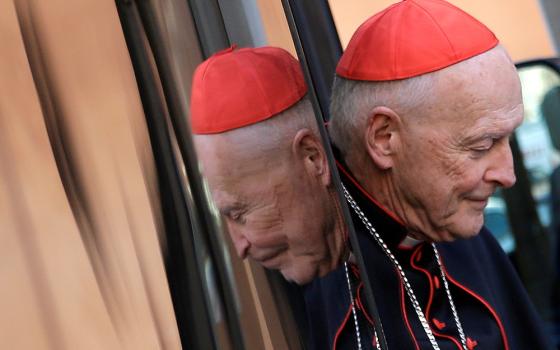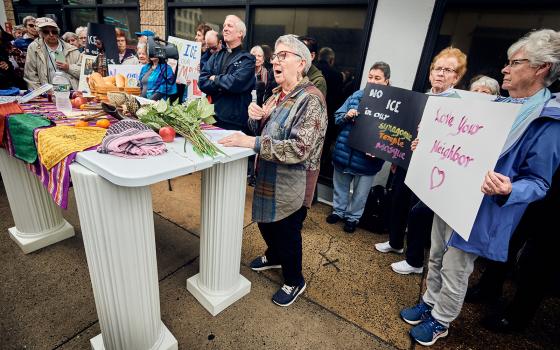As the United States gears up for the next presidential election in 2016, would-be contenders are already coming forward to announce their candidacies. As soon as each makes his or her intentions public, the race begins -- not the presidential race, but a parallel race bent on smearing the opposition by digging into their personal lives for every true or unsubstantiated detail that might cast doubt on their abilities, ethics, principles and values.

| Nineteenth Sunday in Ordinary Time |
| 1 Kings 19:24-8 Psalm 34 Ephesians 4:30-5:2 John 6:41-51 |
Why? What part of human nature wants to put another person down? Why do we listen to these accusations? While it may be difficult to explain such meanness, it is, unfortunately, nothing new.
In today's Gospel, Jesus' statement "I am the living bread that came down from heaven" and his references to "my Father" drew the contempt of the crowd. They thought Jesus was overreaching in calling God "my Father." They knew his parents and knew that he had come from Nazareth, not heaven!
They were unwilling to open themselves to what Walter Brueggemann has called "otherwise" (Testimony of Otherwise, Chalice Press, 2001). Because of the human need "to control ourselves and our world, we try to establish a fixed, visible, settled 'given' that is beyond criticism or reexamination, a 'given' that variously partakes of intellectual, socioeconomic, political and believing components." Once it is established, we protect this "given" by refusing any alternative.
But Jesus, like the prophets before him, understood that despite any "given," God always offers the possibility of "otherwise."
For example, when Elijah (first reading) prophesied drought, and famine ensued, he was able, by God's power, to provide an endless supply of food for a widow and her son. When that son died, Elijah, by God's power, revived him, offering life as an alternative to death.
When his contemporaries were tempted to worship the baals, he exposed those false gods as helpless frauds, offering the "otherwise" of the one, true God. When all turned a blind eye to King Ahab's dishonest and immoral dealings, Elijah confronted the king with his sins. He offered the "otherwise" of truth in the face of deception.
"When the early church pondered Jesus," writes Brueggemann, "cadences of Elijah rang in their ears because they sensed that Jesus was an enactment of a dangerous, healing, liberating otherwise that could not be stopped."
For these reasons, Jesus' contemporaries had questioned his origins and his teachings. He was perceived as a threat to their traditional "given" of law and liturgy and purity, and in the end, they killed him instead of listening and learning.
But there were some who did heed him and who allowed themselves to be taught. These were the tenders and keepers of otherwise, our ancestors in the faith. Even in more recent years, some among us have kept otherwise before our eyes and imaginations.
Archbishop Oscar Romero, who was martyred for his faith in El Salvador, daily confronted an unjust military government with its crimes, all the while calling for peace and justice. Mother Teresa confronted poverty and disease with love and compassion. Dorothy Day did not fear to speak out on behalf of the disenfranchised and neglected. Nelson Mandela could have been angry and embittered by his 27 years of unjust imprisonment, but chose to forgive. Mohandas Gandhi chose the path of peace and nonresistance rather than violence and war. Martin Luther King Jr. had a dream of equality and justice while others clung to hatred, slavery and segregation.
This theme of choosing a holy alternative is reflected in today's second reading. There, the Deutero-Pauline author asks readers to choose the way of love, as Christ did. Eschewing bitterness, fury, anger, shouting and all malice, Jesus chose instead the "otherwise" of love, compassion and forgiveness.
If we are his disciples, then we witness to that belonging in all we are, in all we do, in all we think, in all we choose. This means going beyond the status quo and thinking outside the expected and acceptable. This means daring to be the unpopular one who listens not to popular opinion or even to the biggest majority, but to God, to Jesus, to the Gospel.
For his efforts at otherwise, Elijah found himself hiding in the desert and praying for death. The early believers in Jesus were ousted from the synagogue by the Jews who thought them to be heretics. They were also persecuted for their faith by the Romans. Jesus lost many disciples that day when he proclaimed, "I am the Bread of Life." They found his words "hard to endure" (John 6:60).
How will you choose? Robert Frost's words come to mind here: "Two roads diverged in a wood, and I --/ I took the one less traveled by,/ and that has made all the difference" (Mountain Interval, 1920).
[Patricia Sánchez holds a master's degree in literature and religion of the Bible from a joint degree program at Columbia University and Union Theological Seminary in New York.]




